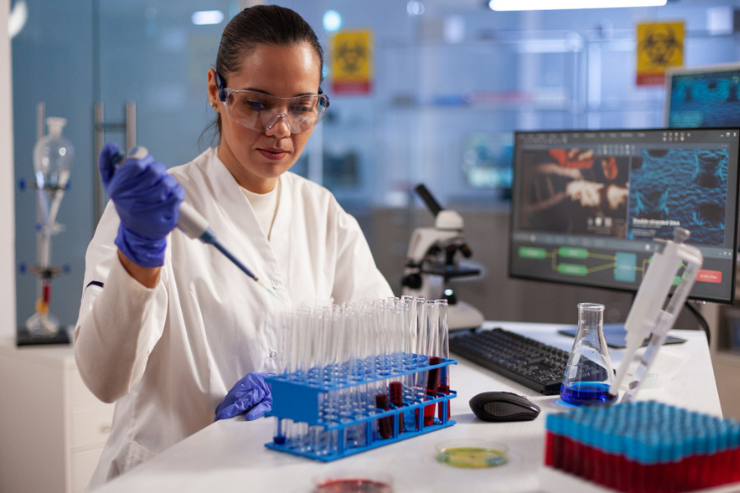
Serology is a branch of clinical pathology that focuses on the detection of antibodies in blood serum. It plays a vital role in diagnosing infectious diseases and evaluating immune system responses.
Serology tests are crucial for:
Diagnosing Infections: Detecting antibodies produced in response to viruses, bacteria, or other pathogens.
Monitoring Vaccination Effectiveness: Assessing antibody levels after vaccination to ensure immune protection.
Investigating Autoimmune Disorders: Identifying antibodies that attack the body’s own tissues in autoimmune diseases.
Antibody Detection Tests: Identify specific antibodies present in the blood, indicating exposure to infections such as COVID-19, hepatitis, or HIV.
Antigen Detection Tests: Detect viral or bacterial antigens to diagnose active infections like influenza or streptococcus.
Rapid Diagnostic Tests (RDTs): Provide quick results for infectious diseases, allowing for prompt treatment and isolation measures.
Autoantibody Tests: Identify antibodies targeting the body’s tissues in conditions like rheumatoid arthritis or lupus.
Immunoglobulin Tests: Measure levels of different types of antibodies (IgG, IgM, IgA) to monitor immune responses and diagnose immune deficiencies.
Serology testing is essential in epidemiology, public health surveillance, and clinical settings to track disease prevalence, assess immunity levels in populations, and guide treatment decisions. It helps healthcare providers understand the dynamics of infectious diseases and develop effective strategies for disease control.
Serologists, trained in interpreting serology test results, play a critical role in diagnosing infections, monitoring immune responses, and guiding patient care. They collaborate with healthcare teams to ensure accurate diagnosis and appropriate management of infectious and autoimmune conditions.
Serology is a branch of clinical pathology that focuses on the detection of antibodies in blood serum. It plays a vital role in diagnosing infectious diseases and evaluating immune system responses.
Serology tests are crucial for:
Diagnosing Infections: Detecting antibodies produced in response to viruses, bacteria, or other pathogens.
Monitoring Vaccination Effectiveness: Assessing antibody levels after vaccination to ensure immune protection.
Investigating Autoimmune Disorders: Identifying antibodies that attack the body’s own tissues in autoimmune diseases.
Antibody Detection Tests: Identify specific antibodies present in the blood, indicating exposure to infections such as COVID-19, hepatitis, or HIV.
Antigen Detection Tests: Detect viral or bacterial antigens to diagnose active infections like influenza or streptococcus.
Rapid Diagnostic Tests (RDTs): Provide quick results for infectious diseases, allowing for prompt treatment and isolation measures.
Autoantibody Tests: Identify antibodies targeting the body’s tissues in conditions like rheumatoid arthritis or lupus.
Immunoglobulin Tests: Measure levels of different types of antibodies (IgG, IgM, IgA) to monitor immune responses and diagnose immune deficiencies.
Serology testing is essential in epidemiology, public health surveillance, and clinical settings to track disease prevalence, assess immunity levels in populations, and guide treatment decisions. It helps healthcare providers understand the dynamics of infectious diseases and develop effective strategies for disease control.
Serologists, trained in interpreting serology test results, play a critical role in diagnosing infections, monitoring immune responses, and guiding patient care. They collaborate with healthcare teams to ensure accurate diagnosis and appropriate management of infectious and autoimmune conditions.
Ruler Diagnostics Pvt. Ltd, where we prioritize your health and well-being through comprehensive and precise diagnostic services. Our journey began with a shared vision among seasoned healthcare professionals to establish a diagnostic center that combines cutting-edge technology with compassionate care.